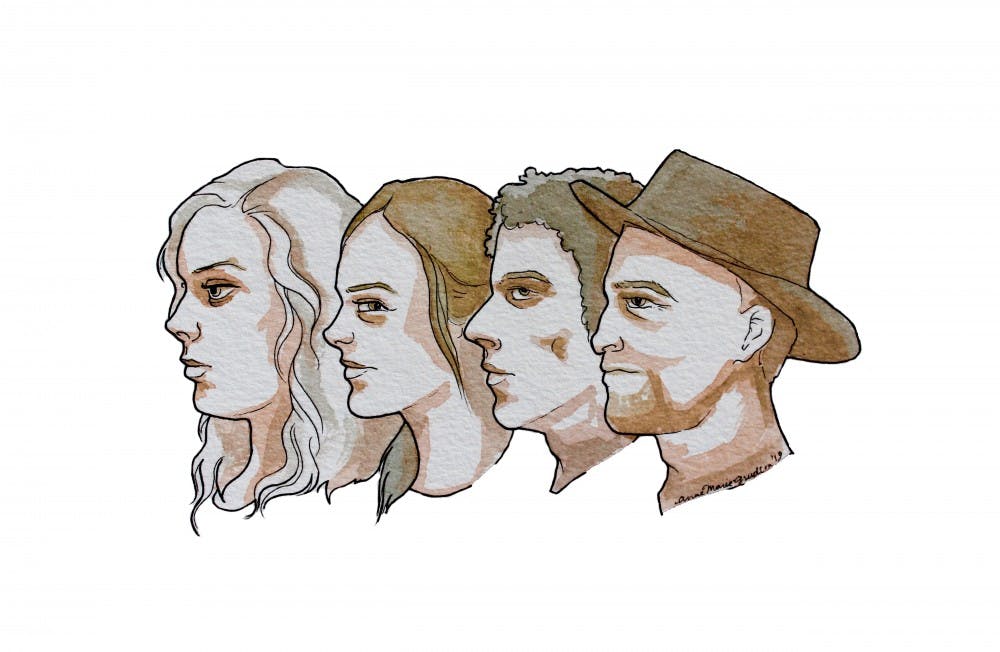When the first Zombieland came out ten years ago, it featured a pre–fame Emma Stone and Jesse Eisenberg, alongside Woody Harrelson and a young Abigail Breslin. The film was a critical and commercial hit, full of dark, irreverent humor and a cast with unexpected chemistry. The backdrop of a gory zombie apocalypse, of course, just added to the entertainment. On Oct. 18, the original cast returns—now all Academy Award nominees or winners—in the horror–comedy sequel, Zombieland: Double Tap. The chemistry is still there, and the gore is turned up to 11, but though the cast (now with a few new additions) still brings a lot of fun, they have very little to work with.
The film opens strong, as Eisenberg’s Columbus—still the awkward, neurotic narrator from before—catches us up on what has happened since the first movie. There are now different types of zombies, described in a fun line–up reminiscent of the famous rules for survival from the first film. In a grisly scene set to Metallica that is both giddy and badass—much like what made the first film tick—the gang clears through zombies toward a dilapidated White House.
From that point on, Double Tap quickly depicts the gang’s domestic life in Zombieland. There’s the hilariously dysfunctional dynamic between the tough old cowboy Tallahassee (Harrelson) and surrogate daughter Little Rock (Breslin), who’s growing into a rebellious teen. There’s also the off–kilter but cute relationship between Columbus and Wichita (Stone), a hardened cool girl and Little Rock’s older sister. And while these sound like tropes, the commitment and heart from each actor—and how effortlessly they play off of each other—is what makes it so fun, but surprisingly moving, too.
Here, Double Tap had an interesting opportunity: to delve into these new group dynamics and explore how they might grow and change. Yet, the film opts to follow exactly in the footsteps of the original. After Columbus gets too close to Wichita, and Tallahassee bonds with Little Rock, the sisters take off—promising to care for no one but each other, and leaving the disgruntled men behind just like they did in the first movie.
Of course, there’s the twist that Little Rock then ditches Wichita, forcing her to come back and team up with the boys in order to track down her sister. Later on, after some road trip hijinks (just like in the first movie), the film ends with a flashy, bloody finale full of over–the–top zombie killings, heroes rolling in to save the day, and an almost–sacrifice by Tallahassee (just like in the first movie). Only this time, the kills are less original, even if more gory—there was almost no tension, as every twist felt stale. And the ending is—for a horror–comedy—much too sappy.
When the first Zombieland premiered, it was fresh and fun. It didn’t shy away from the horror, and created some actual tense moments amid all the meta–humor. It also brought out the priceless buddy relationship between Columbus and Tallahassee, and mixed them perfectly with the sisters. When the gang drove away together at the end of Zombieland, there was uncertainty about the danger they faced. This—combined with how these unlikely people found each other—grounded an extremely irreverent film with actual emotional weight.
In Double Tap, the fans of the original expected to see these memorable characters grown up and dealing with different issues. Instead, Double Tap gave them more of the same. At the end of the film, the group drives off into the sunset—only now with Tallahassee’s newfound girlfriend Nevada (Rosario Dawson). Columbus once again declares that he has found his home, which is with the people that he loves. As much fun as this group is, how many times can they learn this same lesson?
Granted, there are still highlights throughout Double Tap. Even with less–than–original material, the cast brings fun, campy performances. Harrelson is gleefully unhinged with his violent–on–the–outside–soft–on–the–inside shtick, and Zoey Deutch gives it her all as a ditzy blonde, Madison. With great comedic timing, Deutch turns a stereotype into an endearing character who’s fun to watch. The rest of the supporting cast—Rosario Dawson, Avan Jogia, Luke Wilson, and Thomas Middleditch—are given one–note characters, but none of them phone it in.
The first Zombieland worked so well because it was a horror–comedy. It found hilarity in the most gory, disgusting circumstances, and depicted some funny and sincere group dynamics. Double Tap, by leaning too much into the ridiculousness, forgets the darker edge that made the humor work. It also rehashes the same old dynamics instead of trying something new, like its predecessor did. In many ways, Zombieland: Double Tap is much more of a Hollywood blockbuster. It’s got more star power, a more explosive finale, and makes the zombie apocalypse look more fun. But though the film is much gorier than the original, Zombieland: Double Tap still feels sanitized and predictable.







